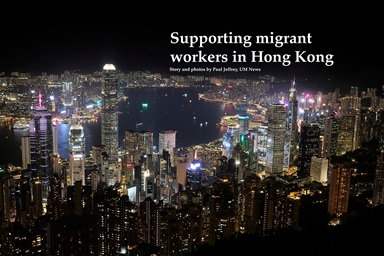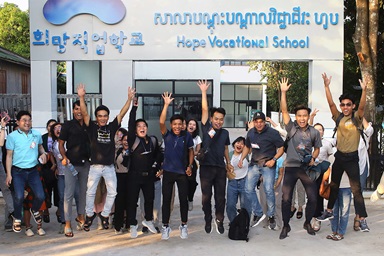God, our protector and source of hope, help us to remember that wealth is often simply the flip side of poverty and exploitation elsewhere in the world. Give us the strength to recognize our lives are inextricably tied with those struggling to find freedom from trafficking. Amen.
With the deadline moving closer for the international community to achieve significant goals to relieve human suffering, the Rev. Liberato Bautista decided he had to take action.
"When I was looking at the Millennium Development Goals, I said, '...these goals are not going to be (implemented). We have to start praying for the implementation because they are too important to be neglected,'" he recalled.
The United Nations developed the Millennium Development Goals to focus the world's attention on reducing poverty, protecting the vulnerable, decreasing the numbers of mothers and babies who die in childbirth, and achieving other steps by 2015.
Bautista, the United Methodist Board of Church and Society's executive representative to the United Nations, put together a prayer guide with contributions from writers around the world. The result was "Meditations and Devotions on the Millennium Development Goals," which was launched in February 2012. It has taken on new significance as another year passes and the 2015 deadline nears.
Millennium Development Goals
- Eradicate extreme poverty and hunger.
- Achieve universal primary education.
- Promote gender equality and empower women.
- Reduce child mortality.
- Improve maternal health.
- Combat HIV/AIDS, malaria and other diseases.
- Improve environmental sustainability.
- Develop a global partnership for development.
"This book ... helps provide a moral construct through which we see that these eight goals are not just national and governmental goals, but nearer the core of the Christian gospel - the Christian gospel of justice and peace and wholeness and fullness of life," Bautista said.
The book is extraordinary because it brings together the voices of people from around the world who are "from the base," said the Rev. Rex Reyes, general secretary of the National Council of Churches in the Philippines. Most of the contributors are people "from the roots of the grass," doing what they can for a better world, he said.
The book is "very Methodist," Reyes said. It is guided primarily by The United Methodist Church's social teachings. "It saddens me that the voices of the indigenous people don't seem to come out," he said, adding that perhaps they will for a future project.
"This book is a trailblazing effort of a faith trying to make itself heard," Reyes said. It "feeds us spiritually and convicts our social consciousness.
"For me, I have the book on my table as a daily source of nurture from now on."
A warning
"Today, 50,000 people continue to die daily because of poverty," said Norma Dollaga, chair of the Philippines Annual Conference's board of church and society. In the last quarter, 4.5 million families in the Philippines went hungry.
A devotional
Don't ignore this epidemic. Human trafficking is one of the world's dirtiest and best-kept secrets. It is difficult to measure the extent of this hidden trade, but United Nations statistics estimate that 2 million to 4 million people are trafficked across international borders every year, and millions more are exploited within their own countries.
I am spending the summer working on human trafficking issues for IOM (International Organization for Migration) in Tajikistan. I feel blessed to be working with the inspiring staff here who continually give themselves to this cause, no matter how many trafficking horror stories they encounter. Tajikistan is the poorest state in Central Asia, and one in two households has sent a family member abroad in hopes that they can send much-needed remittances back home. Some, however, have found more sinister ways to earn their keep, taking advantage of the most vulnerable labor migrants by trafficking them abroad for sexual exploitation, domestic servitude and slave labor in sweatshops, construction, agriculture and more.
There are more slaves today than at any other time in human history. It is tempting to ignore this epidemic. After all, if there were no demand for cheap goods or the services often provided by trafficking victims, such as sex work, the criminals behind trafficking would have no reason to continue exploiting their victims.
- Anne Johnson, Minocqua, Wis., USA
Bible reading: Although we are of the same flesh and blood as our countrymen and though our children are as good as theirs, yet we have to subject our sons and daughters to slavery. Nehemiah 5:5 (NIV)
Prayer: God, our protector and source of hope, help us to remember that wealth is often simply the flip side of poverty and exploitation elsewhere in the world. Give us the strength to recognize our lives are inextricably tied with those struggling to find freedom from trafficking. Amen.
Deed for the Day: Examine the way your consumption decisions may help to fuel demand for the exploitation of the world's most vulnerable workers.
"The book is a warning," she said. " ... It will disturb us and fill our hearts with longing to see ... justice." It is also an invitation to follow our faith and love our neighbor, and a reminder that "there is no holiness but social," she said.
The book took three years to compile, Bautista said. He said he first considered doing a 60-day devotional guide, but as he traveled around the world and invited 300 to 400 people to contribute, he ended up with enough material for 117 days. The devotional guide approach was inspired by the Ilocano version of The Upper Room that his mother read when Bautista was growing up in rural Sanchez Mira town in northern Philippines.
Bautista's career has reflected his ongoing concern for the poor and marginalized, starting from the days when he and his wife were activists and church youth leaders during the difficult years of the military regime of Ferdinand Marcos in the Philippines.
"My wife and I were both student activists and national United Methodist Youth Fellowship officers during the hardest time in the political and national life of the Philippines," he said. "And we struggled with how to deal with the immense poverty of this country, and yet, (it has an) abundance of resources. Therefore, the unequal distribution of wealth is one that would (be) glaring in one's eyes when you deal with issues in the Philippines."
The Millennium Development Goals are a way to raise the faith community's awareness to those types of issues, he said. He refers to them in one sense as "minimum development goals" to lift those who are in extreme poverty into regular poverty.
Political will ... and prayer
Governments have shown a lack of political wisdom and courage in working for the goals, he said. At the same time, "political will is welling up from people to better their lives for sustainability, to better their lives for mental health and public (health), to better their lives with respect to the eradication of hunger and poverty."
His response, he said, is to lift the eight goals up in the context of prayer, with an emphasis on Micah 6:8. The first three goals relate to seeking justice, the second set relates to loving mercy, and the last two relate to walking humbly with God.
The Board of Church and Society published an initial 4,000 copies of the book. Proceeds from the sale of the $7.95 book will support The United Methodist Church's Imagine No Malaria campaign, the denomination's Global AIDS Fund and relief and rehabilitation efforts in the Philippines from the typhoons that visit the country year-round. The book (ISBN 978-1-4507-9931-7) can be ordered online.
*Tanton is executive director of content at United Methodist Communications.
News media contact: Tim Tanton, Nashville, Tenn., (615) 742-5470 or [email protected].
Like what you're reading? Support the ministry of UM News! Your support ensures the latest denominational news, dynamic stories and informative articles will continue to connect our global community. Make a tax-deductible donation at ResourceUMC.org/GiveUMCom.




